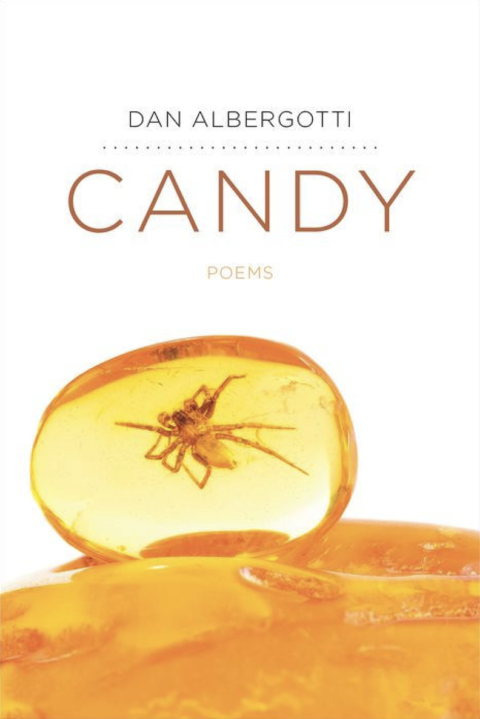Dan Albergotti’s Candy is a beautifully composed book that manages to love the cosmos even as it offers a series of elegies, including several for our beleaguered planet. Albergotti’s third full-length collection documents the poet’s need to wrest beauty from truth while “Cursing a father, pulling / a mother out of a conjurer’s hat, reanimating a torn-apart dog.” Memory animates the poet’s sense of self within a skein of kinship; the ghost of Hamlet and Keats’s living hand steer Albergotti through a world at risk, its chaos echoed in the play between established forms and rougher music. If Keats has a claim as Candy’s governing spirit, so do the rock bands that launch their earworms through the writer’s life (the book comes with a playlist). “I’ve never been Keats, certain of the truth / of the imagination and his heart. / I’ve only been certain of my own death,” the poet writes. A reader will eagerly share his search for imagination and heart. As for the quotation’s third line, Albergotti is trying not to become a ghost but, in the service of his art, he is willing to confront several of them.
Among them are an abusive father who told “the son / and daughter … to make other of themselves,” and a mother who lies because it gave her “… power she never had anywhere else.” Loss of faith — with Albergotti’s injunction from “The Father,” to “Imagine / there’s no heaven, only a gated garden of bush / … / and beast and bawling child,” and in the wish for a soul-making angel “not … of his father’s world” in “The Son” — haunts other poems in which man remains a wolf to man while ignoring the earth that sustains him.
“Tongue and Torque” begins with a missing girl whose tongue detectives find near “the spot where they found her hair”:
They tag and bag and clock out for the night.
In the trees the bird (is it a swallow
or a nightingale?) watches as it sings
its song about the sameness of the day.
 The words surrounding murder and dismemberment are one or two syllables, Saxon-derived (even the exotic, old-world “nightingale”), and as close to living speech as poetry gets. The speaker is casually informative; he wants you to know that medieval torture chambers were sited under spiral stairs, so “twisting screams would lose their torque, / fall to a whisper in the upper rooms / where priests might place a host upon a tongue.” Albergotti knits the Tower of Babel, the myth of Philomela, a first date, and his mother’s loss into a discursive, witty, and chilling excursion. If he quotes Robert Frost’s dictum that poetry is what “gets lost / in translation,” he adds to the loss, “as if one human tongue / can never completely reach another.” Albergotti flirts with Frost’s blank verse in lines as utterly natural and effortless as the best dialogue, while sharing the poet’s frosty view of human nature.
The words surrounding murder and dismemberment are one or two syllables, Saxon-derived (even the exotic, old-world “nightingale”), and as close to living speech as poetry gets. The speaker is casually informative; he wants you to know that medieval torture chambers were sited under spiral stairs, so “twisting screams would lose their torque, / fall to a whisper in the upper rooms / where priests might place a host upon a tongue.” Albergotti knits the Tower of Babel, the myth of Philomela, a first date, and his mother’s loss into a discursive, witty, and chilling excursion. If he quotes Robert Frost’s dictum that poetry is what “gets lost / in translation,” he adds to the loss, “as if one human tongue / can never completely reach another.” Albergotti flirts with Frost’s blank verse in lines as utterly natural and effortless as the best dialogue, while sharing the poet’s frosty view of human nature.
“I Listened to the Song ‘I Watched the Film The Song Remains the Same’” is a far-ranging meditation on the quality of forgiveness, and death’s hard stop to revising a life. Framed by an incident in an elementary school playground, it’s also an elegy for Jake Adam York and Inscriptions for Air, his ongoing project commemorating the civil rights martyrs memorialized at The National Memorial for Peace in Justice in Montgomery, which ended with York’s death at 40 (his editor, John Tribble, planned to invite other poets to add to the project; “Inscription in the Wake” is Albergotti’s contribution). “Sometimes I tell my students that poetry is / the persistent, futile effort to earn self-forgiveness,” Albergotti writes, recalling how “in that song,” the singer remembers “having once been baited into clocking / some underserving boy” just as Albergotti did. The poet’s litany of sudden death –– “You don’t just go to a convenience store for Skittles / … and die until you do. / You don’t just reach for your glove compartment // with a child in the back seat and die/until you do” –– alternates with headlines from a disinterested natural world:
The rabbit stretches in the grass, the cockroach
Scurries in the walls, the dew resolves
into a gas, the yellow-throated warbler calls
Albergotti breaks up what could have been perfectly end-rhymed, metrical pentameter lines, disrupting the possibility of repair; the poem ends with the boy Albergotti “clocked” resurfacing through “the online obituary I found.”
 Extinction is planetary and personal when excavators prep an oil rig site “five miles from home” in “Earth Shovel.” Musing on fossils that power his commute, Albergotti writes, “The thing about the universe is that it seems infinite, but really it’s only a ceaseless series of extinctions.” He notes that friends with a new baby “… expect the world for her,” nudging readers to ask, what sort of world? “Pastime” considers how “telegraph” evolved as a baseball metaphor “in the late 1860s,” when “… this nation and species and planet still had a chance.” “The Beetles,” an abecedarian made up of titles of Beatles songs, praises the wonder of watching a “little guy” –– the “two of us one world not found across the /universe” –– now “Human life is so / yesterday.”
Extinction is planetary and personal when excavators prep an oil rig site “five miles from home” in “Earth Shovel.” Musing on fossils that power his commute, Albergotti writes, “The thing about the universe is that it seems infinite, but really it’s only a ceaseless series of extinctions.” He notes that friends with a new baby “… expect the world for her,” nudging readers to ask, what sort of world? “Pastime” considers how “telegraph” evolved as a baseball metaphor “in the late 1860s,” when “… this nation and species and planet still had a chance.” “The Beetles,” an abecedarian made up of titles of Beatles songs, praises the wonder of watching a “little guy” –– the “two of us one world not found across the /universe” –– now “Human life is so / yesterday.”
Those imagining something sweet in the book’s title will find they are mistaken: Candy is a dog given away by the estranged wife of a musician who afterwards hanged himself. Albergotti writes that “… the people who took her in / surely, surely must have, had to have / could not have shown her that love / that makes it worth being torn apart.” The speaker may hope that love’s power balances life’s damage, but those repetitions stutter his doubts. A reader needs turn to the book’s first poem, preceding its three sections, to place Candy in brighter relief. In “Kick in the Jaw,” sometimes “the zebra’s kick” finds “the lion’s jaws” and, though an indifferent savannah’s “sound goes on,” some “stories get rewritten.” May Albergotti’s cadences, sounds, and kicks go on for many more equally gratifying collections.
[Published by LSU Press on June 3., 2024, 78 pages, $19.95 paperback]